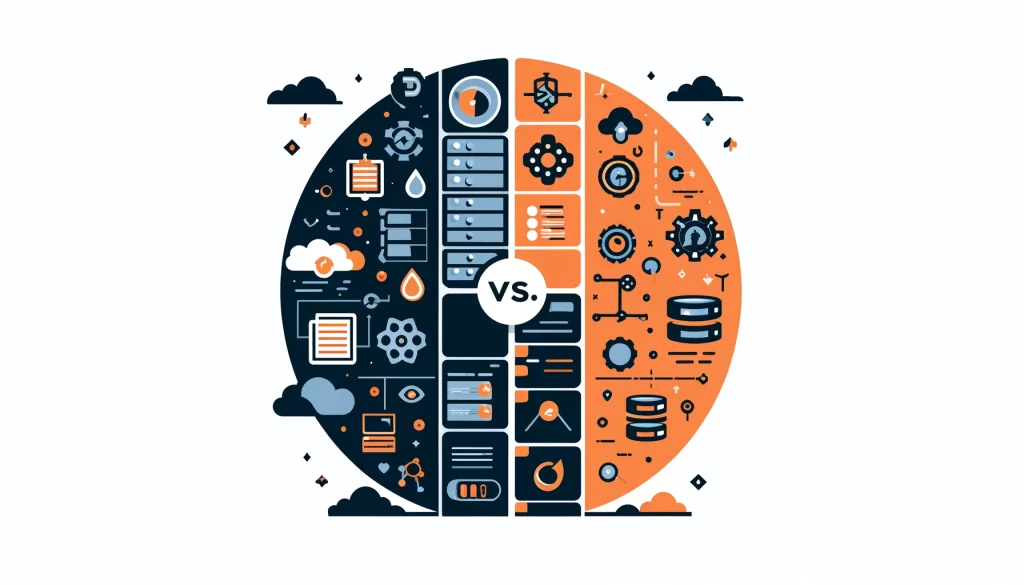
DataOps vs DevOps

Two popular methods in the fast-changing world of software development and data management are DataOps and DevOps. While they may appear similar at first glance, they serve distinct purposes and involve different teams and skill sets. Let’s dive deeper into the world of DataOps and DevOps to understand their differences and how they contribute to the success of organizations.
What is DevOps?
DevOps is a methodology that combines development and operations teams. It aims to speed up and improve product development. The term “DevOps” stands for Development Operations. It aims to break down the silos between these teams and foster collaboration throughout the software development lifecycle.
The development component of DevOps focuses on planning, designing, and creating software packages. This involves tasks such as writing code, building features, and ensuring the software meets the required specifications. The operations component, on the other hand, is responsible for monitoring the delivery and release of the product. This includes tasks such as installing, controlling the technology, and ensuring the software works well in real-life situations.
DevOps emphasizes a continuous process that involves constant feedback and communication between the development and operations teams. This method helps quickly find and fix problems, and also lets us use feedback from users and adjust to new needs.
The Need for DevOps
Implementing DevOps offers several significant benefits to organizations. By removing separate teams for engineering, IT operations, development, and quality assurance, DevOps reduces product development costs and accelerates release cycles. This streamlined approach allows for faster iteration and more frequent releases of software products.
DevOps also improves security and flexibility during the production and delivery process. DevOps helps to create a more secure and resilient software environment thanks to integration of security practices into the development lifecycle and automating various processes. By removing external obstacles, teams can work more efficiently and effectively, speeding up the development and deployment process.
By adopting DevOps, organizations can deliver new products and services more innovatively and quickly. This agility allows them to stay competitive in the market and respond to changing customer demands. Organizations can work on updates and new products more quickly with faster release cycles. This helps them stay up to date with rapidly changing technology.
What is DataOps?
DataOps, short for Data Operations, is an emerging approach to data management and operations. DataOps focuses on data-related processes, with an emphasis on agile and continuous delivery. It has similarities to DevOps but has its own unique goals.
DataOps brings data analytics and operations teams together. This helps provide accurate and reliable analytic solutions and products faster. The goal is to improve efficiency and collaboration between the two teams. The ultimate aim is to deliver high-quality results in a timely manner.
Businesses recognize the immense value of actionable insights derived from data. DataOps is a method used by data teams to handle the increasing demand for accurate data. It draws inspiration from the principles and practices of DevOps.
The Need for DataOps
DataOps encompasses several manufacturing methodologies, including lean manufacturing, process control, and agile development. Its primary goal is to help organizations identify and utilize the most suitable data for specific applications. By optimizing data processes and ensuring data quality, DataOps enables organizations to make decisions with confidence.
DataOps teams consist of a diverse range of professionals, including data scientists, data analysts, IT operations specialists, application developers, and business managers. This cross-functional collaboration allows for a holistic approach to data management and the delivery of valuable business insights.
By optimizing existing data models, views, reports, and dashboards, DataOps empowers organizations to achieve their business goals more effectively. It makes the process of creating and delivering analytics solutions faster and cheaper by involving fewer departments.
Automation is crucial in DataOps. It helps data management and operations teams collaborate effectively. It also enables the creation of fast data pipelines. DataOps helps businesses get more value from their data and make quick decisions by automating repetitive tasks and workflows.
Similarities Between DataOps and DevOps
While DataOps and DevOps have distinct focuses, they share some common principles and practices. Both methodologies employ the agile methodology, which involves a consistent and iterative approach to ensure rapid delivery in smaller increments. Rather than working separately on a monolithic package, teams collaborate to develop small modules of the application faster.
Agile management practices help data teams identify bugs and troubleshoot errors more efficiently. It helps teams communicate often and give feedback regularly so they can quickly solve problems and adjust to new needs.
This teamwork allows development teams to use the information from data teams and make changes to their strategies right away. By quickly fixing bugs and resolving errors, teams can ensure a smoother and more reliable software development process.
DataOps is More Than DevOps for Data
Some people think DataOps is similar to DevOps for data. However, there are significant differences between the two methods. These differences extend beyond just data. The fundamental outputs and goals of DataOps and DevOps are distinct.
DevOps primarily focuses on the development and delivery of software products, aiming to streamline the process and improve efficiency. On the other hand, DataOps specifically targets the development, testing, and release of data products and solutions. It emphasizes the importance of data quality, governance, and security throughout the data lifecycle.
The composition of DataOps and DevOps teams also varies because of the different skill sets required. DevOps teams typically consist of professionals with expertise in software engineering, programming, development, application integration, quality control, and security. DataOps teams have a mix of skills. These skills include data science, data management, data integration, statistics, IT operations, application engineering, and data governance.
DataOps and DevOps have similar delivery cycles, with three basic steps: build, testing, and release. However, DataOps includes extra steps to verify data accuracy and application functionality. These extra steps are crucial for maintaining accurate data. They also ensure that data products and solutions meet required standards.
DataOps vs. DataSecOps
DataSecOps is an extension of DataOps that incorporates security protocols, principles, and processes into the data operations landscape. It aligns data solutions with rapidly changing data while ensuring privacy, safety, and governance.
The key difference between DataOps and DataSecOps lies in the emphasis on security throughout the process. In DataSecOps, we do not treat security as an afterthought or a final checkpoint. Instead, it integrates into every step of the data lifecycle, from design to delivery. This proactive approach to security helps identify and mitigate potential risks and vulnerabilities early in the process.
DataSecOps aims to prevent security issues by managing security practices using the DataOps workflow. This integration occurs during the development and delivery of data products and solutions. It ensures that we consistently meet data privacy and compliance requirements throughout the process.
DataOps vs. DataSecOps in Practice
To better understand the differences between DataOps and DataSecOps, let’s consider a practical scenario. Suppose an organization is working on a data project using the DataOps methodology. In this case, the team typically addresses security concerns towards the end of the project. This method can result in a buildup of security risks and problems that may not have been noticed before.
So, the team had to go back to earlier parts of the project to fix security issues. This made the project take longer to finish and cost more money.
Dealing with security issues as they come up may not work well. It could end up hurting the quality and reliability of data products and solutions. Important to address security concerns proactively to maintain the integrity of the data. This approach can help prevent potential problems and ensure the effectiveness of the solutions.
When a company uses a DataSecOps approach, it integrates security into the project from the beginning. The security experts within the team immediately address any security issues that arise. This real-time mitigation of problems allows for a more refined solution with fewer bugs or mistakes by the final phase.
By implementing security throughout the DataOps process, DataSecOps enables organizations to deliver secure and compliant data products and solutions more efficiently. Reducing the risk of security breaches, data leaks, and non-compliance issues helps protect the reputation of an organization. It also ensures the trust of its customers and stakeholders.
Conclusion
DataOps and DevOps are two distinct methodologies that have transformed the way organizations approach software development and data management. They have some things in common, such as using agile methods and working together. However, they have different goals and require different skills.
DevOps aims to streamline the collaboration between development and operations teams to deliver software products more efficiently. It focuses on breaking down silos and fostering a culture of continuous integration and delivery.
On the other hand, DataOps specifically targets the integration of data analytics and operations teams to deliver accurate and reliable data solutions quickly. It emphasizes the importance of data quality, governance, and security throughout the data lifecycle.
DataSecOps takes DataOps a step further by implementing security as a continuous part of the data operations process. It ensures that security is not an afterthought but an integral component of the entire data lifecycle. This proactive approach helps organizations mitigate security risks, protect sensitive data, and maintain compliance with relevant regulations.
By learning about DataOps, DevOps, and DataSecOps, organizations can pick the method that works best for them. Implementing these approaches can lead to faster delivery, improved efficiency, and more reliable and secure software and data products.
